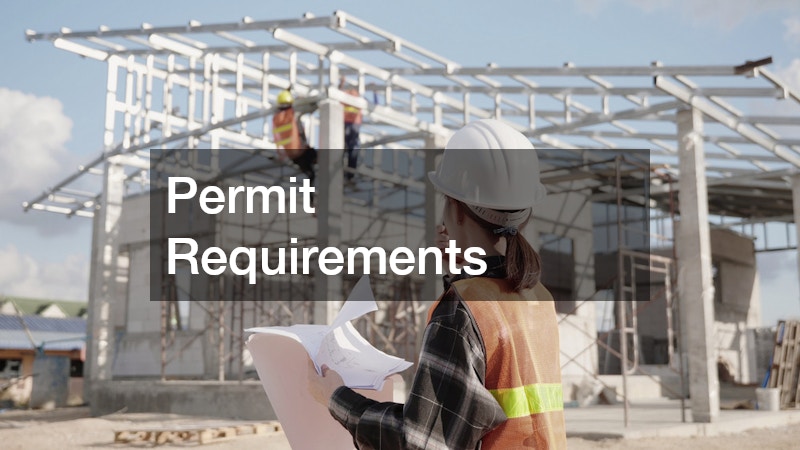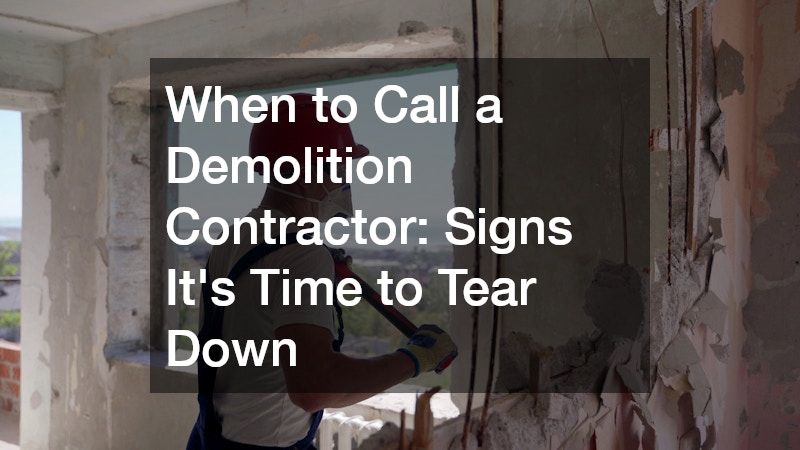In this article, we’ll explore the major signs that indicate it’s time to consider calling a demolition contractor. From safety concerns to property redevelopment, we will provide insights into when tearing down a structure is the best course of action. Whether driven by necessity or opportunity, making an informed decision about demolition can significantly impact future property value and functionality.
What are the safety concerns that necessitate demolition?
Structural Instability
Structural instability is one of the most critical safety concerns that might mandate demolition. A building becomes structurally unstable when its load-bearing components, like beams, columns, or foundations, are compromised.
This poses a severe risk to occupants and neighboring properties, necessitating immediate professional assessment to evaluate if demolition is warranted.
Ignoring signs of structural instability can exacerbate the risk of catastrophic failures. The incidence of partial or total collapse can result in substantial injury, loss of life, and liability issues. This makes it crucial for property owners to engage with professionals for regular inspections and risk assessments.
Hazardous Materials
The presence of hazardous materials such as asbestos and lead is a significant concern requiring professional demolition. These materials were commonly used in older buildings due to their advantageous properties, like thermal insulation and fire resistance. However, they are now known to pose severe health risks, necessitating specialized removal procedures.
Long-term exposure to hazardous materials can lead to serious health problems, including respiratory diseases and cancer. Given these risks, property owners are often legally required to remove such materials before renovation or demolition. Professional demolition contractors are trained to safely manage and dispose of hazardous substances, ensuring compliance with environmental and health regulations.
Fire or Water Damage
Extensive fire or water damage can severely compromise the safety of a building, making demolition necessary. Fire can weaken structural components, destroy vital infrastructure, and present long-term safety hazards even after the flames are extinguished. Water damage, on the other hand, can lead to structural decay, mold growth, and other systemic issues.
After a fire, the integrity of a building must be carefully evaluated by professionals to determine its safety. The high risk of latent damage hidden beneath charred surfaces or soaked interiors often calls for thorough inspections. Demolition is often a pragmatic choice when remediation efforts exceed the building’s recoverable value or when the safety of occupants cannot be assured.
How to determine the economic viability of demolition?
Cost-Benefit Analysis
A cost-benefit analysis is a critical tool when deciding between renovating and demolishing a building. Property owners must weigh the estimated cost of repairs, upgrades, and ongoing maintenance against the potential benefits of relying on new construction. Such analysis includes immediate costs and long-term returns on investment, which are pivotal in decision-making.
This analysis should also factor in the time and inconvenience associated with prolonged renovations versus the relatively accelerated timeline of new construction. By evaluating these elements, property owners can understand the financial implications of each option. In many cases, the escalating costs of renovation combined with limited future returns may justify opting for demolition.
Market Value of Land vs. Structure
In assessing economic viability, comparing the market value of the land itself versus the existing structure is pivotal. Sometimes, the land’s value might surpass the worth of the building, especially in rapidly developing areas with high demand for new properties. This mismatch often incentivizes property owners to consider demolition for better utilization of their land.
Evaluating the potential increase in property value post-demolition can guide decisions significantly. An increase in land value can be realized through redevelopment, aligning with broader market trends. In high-value markets, the promise of lucrative returns can provide compelling justification for demolition.
Potential for Redevelopment
The potential for redevelopment can strongly influence whether demolition is an economically sound decision. In areas where land values are appreciating or where there are opportunities for more lucrative ventures, demolishing an outdated structure can be advantageous. New developments that maximize utility, aesthetics, and market demand offer enticing incentives for property transformation.
Identifying viable redevelopment opportunities involves analyzing patterns like demographic shifts, urban expansion, and new infrastructure projects. Property owners should evaluate local planning initiatives to align their projects with community growth strategies. When the potential benefits of redevelopment far outweigh those of maintaining the current structure, demolition becomes a logical step.
What legal or regulatory requirements influence the decision to demolish?
Zoning Laws and Regulations
Zoning laws profoundly impact decisions related to demolition and construction. These regulations dictate what can be built on a property, affecting how it can be used or redeveloped after demolition. Adhering to zoning requirements ensures that any planned demolition aligns with municipal strategies and legal standards.
Non-compliance with zoning laws can lead to legal repercussions and costly delays, emphasizing the importance of professional guidance. Understanding these laws helps property owners maximize their property’s use while avoiding potential conflicts. Ensuring projects align with zoning codes is essential for seamless and lawful property development.
Permit Requirements
The decision to demolish is heavily influenced by the need to secure appropriate permits. Permits ensure that demolition is conducted safely and ethically, following local regulations. Failure to acquire necessary permits can result in fines, legal action, and delays, underscoring their importance.
Understanding the specific permit requirements is vital, as they vary significantly based on location and project scope. Consulting with legal experts and local government bodies facilitates straightforward navigation through the permit process. Accurately securing permits guarantees compliance and fosters smooth project progression.
Deciding when to call a demolition contractor hinges on understanding safety implications, economic factors, and legal requirements. By recognizing the signs outlined, property owners can make informed decisions to effectively manage their assets and enhance land usability. Expert guidance bridges the gap between potential risks and opportunities, ensuring that properties are safely transformed to meet evolving needs.
.




